#revealed preferences
Text
Freedom of reach IS freedom of speech

The online debate over free speech suuuuucks, and, amazingly, it’s getting worse. This week, it’s the false dichotomy between “freedom of speech” and “freedom of reach,” that is, the debate over whether a platform should override your explicit choices about what you want to see:
https://seekingalpha.com/news/3849331-musk-meets-twitter-staff-freedom-of-reach-new-ideas-on-human-verification
It’s wild that we’re still having this fight. It is literally the first internet fight! The modern internet was born out of an epic struggled between “Bellheads” (who believed centralized powers should decide how you used networks) and “Netheads” (who believed that services should be provided and consumed “at the edge”):
https://www.wired.com/1996/10/atm-3/
The Bellheads grew out of the legacy telco system, which was committed to two principles: universal service and monetization. The large telcos were obliged to provide service to everyone (for some value of “everyone”), and in exchange, they enjoyed a monopoly over the people they connected to the phone system.
That meant that they could decide which services and features you had, and could ask the government to intervene to block competitors who added services and features they didn’t like. They wielded this power without restraint or mercy, targeting, for example, the Hush-A-Phone, a cup you stuck to your phone receiver to muffle your speech and prevent eavesdropping:
https://en.wikipedia.org/wiki/Hush-A-Phone
They didn’t block new features for shits and giggles, though — the method to this madness was rent-extraction. The iron-clad rule of the Bell System was that anything that improved on the basic service had to have a price-tag attached. Every phone “feature” was a recurring source of monthly revenue for the phone company — even the phone itself, which you couldn’t buy, and had to rent, month after month, year after year, until you’d paid for it hundreds of times over.
This is an early and important example of “predatory inclusion”: the monopoly carriers delivered universal service to all of us, but that was a prelude to an ugly, parasitic, rent-seeking way of doing business:
https://lpeproject.org/blog/predatory-inclusion-a-long-view-of-the-race-for-profit/
It wasn’t just the phone that came with an unlimited price-tag: everything you did with the phone was also a la carte, like the bananas-high long-distance charges, or even per-minute charges for local calls. Features like call waiting were monetized through recurring monthly charges, too.
Remember when Caller ID came in and you had to pay $2.50/month to find out who was calling you before you answered the phone? That’s a pure Bellhead play. If we applied this principle to the internet, then you’d have to pay $2.50/month to see the “from” line on an email before you opened it.
Bellheads believed in “smart” networks. Netheads believed in what David Isenberg called “The Stupid Network,” a “dumb pipe” whose only job was to let some people send signals to other people, who asked to get them:
https://www.isen.com/papers/Dawnstupid.html
This is called the End-to-End (E2E) principle: a network is E2E if it lets anyone receive any message from anyone else, without a third party intervening. It’s a straightforward idea, though the spam wars brought in an important modification: the message should be consensual (DoS attacks, spam, etc don’t count).
The degradation of the internet into “five giant websites, each filled with screenshots of text from the other four” (h/t Tom Eastman) meant the end of end-to-end. If you’re a Youtuber, Tiktoker, tweeter, or Facebooker, the fact that someone explicitly subscribed to your feed does not mean that they will, in fact, see your feed.
The platforms treat your unambiguous request to receive messages from others as mere suggestions, a “signal” to be mixed into other signals in the content moderation algorithm that orders your feed, mixing in items from strangers whose material you never asked to see.
There’s nothing wrong in principal with the idea of a system that recommends items from strangers. Indeed, that’s a great way to find people to follow! But “stuff we think you’ll like” is not the same category as “stuff you’ve asked to see.”
Why do companies balk at showing you what you’ve asked to be shown? Sometimes it’s because they’re trying to be helpful. Maybe their research, or the inferences from their user surveillance, suggests that you actually prefer it that way.
But there’s another side to this: a feed composed of things from people is fungible. Theoretically, you could uproot that feed from one platform and settle it in another one — if everyone you follow on Twitter set up an account on Mastodon, you could use a tool like Movetodon to refollow them there and get the same feed:
https://www.movetodon.org/
A feed that is controlled by a company using secret algorithms is much harder for a rival to replicate. That’s why Spotify is so hellbent on getting you to listen to playlists, rather than albums. Your favorite albums are the same no matter where you are, but playlists are integrated into services.
But there’s another side to this playlistification of feeds: playlists and other recommendation algorithms are chokepoints: they are a way to durably interpose a company between a creator and their audience. Where you have chokepoints, you get chokepoint capitalism:
https://chokepointcapitalism.com/
That’s when a company captures an audience inside a walled garden and then extracts value from creators as a condition of reaching them, even when the audience requests the creator’s work. With Spotify, that manifests as payola, where creators have to pay for inclusion on playlists. Spotify uses playlists to manipulate audiences into listening to sound-alikes, silently replacing the ambient artists that listeners tune in to hear with work-for-hire musicians who aren’t entitled to royalties.
Facebook’s payola works much the same: when you publish a post on Facebook, you have to pay to boost it if you want it to reach the people who follow you — that is, the people who signed up to see what you post. Facebook may claim that it does this to keep its users’ feeds “uncluttered” but that’s a very thin pretense. Though you follow friends and family on Facebook, your feed is weighted to accounts willing to cough up the payola to reach you.
The “uncluttering” excuse wears even thinner when you realize that there’s no way to tell a platform: “This isn’t clutter, show it to me every time.” Think of how the cartel of giant email providers uses the excuse of spam to block mailing lists and newsletters that their users have explicitly signed up for. Those users can fish those messages out of their spam folders, they can add the senders to their address books, they can write an email rule that says, “If sender is X, then mark message as ‘not spam’” and the messages still go to spam:
https://doctorow.medium.com/dead-letters-73924aa19f9d
One sign of just how irredeemably stupid the online free expression debate is that we’re arguing over stupid shit like whether unsolicited fundraising emails from politicians should be marked as spam, rather than whether solicited, double-opt-in newsletters and mailing lists should be:
https://www.cbsnews.com/news/republican-committee-sues-google-over-email-spam-filters/
When it comes to email, the stuff we don’t argue about is so much more important than the stuff we do. Think of how email list providers blithely advertise that they can tell you the “open rate” of the messages that you send — which means that they embed surveillance beacons (tracking pixels) in every message they send:
https://www.wired.com/story/how-email-open-tracking-quietly-took-over-the-web/
Sending emails that spy on users is gross, but the fucking disgusting part is that our email clients don’t block spying by default. Blocking tracking pixels is easy as hell, and almost no one wants to be spied on when they read their email! The onboarding process for webmail accounts should have a dialog box that reads, “Would you like me to tell creepy randos which emails you read?” with the default being “Fuck no!” and the alternative being “Hurt me, Daddy!”
If email providers wanted to “declutter” your inbox, they could offer you a dashboard of senders whose messsages you delete unread most of the time and offer to send those messages straight to spam in future. Instead they nonconsensually intervene to block messages and offer no way to override those blocks.
When it comes to recommendations, companies have an unresolvable conflict of interest: maybe they’re interfering with your communications to make your life better, or maybe they’re doing it to make money for their shareholders. Sorting one from the other is nigh impossible, because it turns on the company’s intent, and it’s impossible to read product managers’ minds.
This is intrinsic to platform capitalism. When platforms are getting started, their imperative is to increase their user-base. To do that, they shift surpluses to their users — think of how Amazon started off by subsidizing products and deliveries.
That lured in businesses, and shifted some of that surplus to sellers — giving fat compensation to Kindle authors and incredible reach to hard goods sellers in Marketplace. More sellers brought in more customers, who brought in more sellers.
Once sellers couldn’t afford to leave Amazon because of customers, and customers couldn’t afford to leave Amazon because of sellers, the company shifted the surplus to itself. It imposed impossible fees on sellers — Amazon’s $31b/year “advertising” business is just payola — and when sellers raised prices to cover those fees, Amazon used “Most Favored Nation” contracts to force sellers to raise prices everywhere else.
The enshittification of Amazon — where you search for a specific product and get six screens of ads for different, worse ones — is the natural end-state of chokepoint capitalism:
https://pluralistic.net/2022/11/28/enshittification/#relentless-payola
That same enshittification is on every platform, and “freedom of speech is not freedom of reach” is just a way of saying, “Now that you’re stuck here, we’re going to enshittify your experience.”
Because while it’s hard to tell if recommendations are fair or not, it’s very easy to tell whether blocking end-to-end is unfair. When a person asks for another person to send them messages, and a third party intervenes to block those messages, that is censorship. Even if you call it “freedom of reach,” it’s still censorship.
For creators, interfering with E2E is also wage-theft. If you’re making stuff for Youtube or Tiktok or another platform and that platform’s algorithm decides you’ve broken a rule and therefore your subscribers won’t see your video, that means you don’t get paid.
It’s as if your boss handed you a paycheck with only half your pay in it, and when you asked what happened to the other half, your boss said, “You broke some rules so I docked your pay, but I won’t tell you which rules because if I did, you might figure out how to break them without my noticing.”
Content moderation is the only part of information security where security-through-obscurity is considered good practice:
https://doctorow.medium.com/como-is-infosec-307f87004563
That’s why content moderation algorithms are a labor issue, and why projects like Tracking Exposed, which reverse-engineer those algorithms to give creative workers and their audiences control over what they see, are fighting for labor rights:
https://www.eff.org/deeplinks/2022/05/tracking-exposed-demanding-gods-explain-themselves
We’re at the tail end of a ghastly, 15-year experiment in neo-Bellheadism, with the big platforms treating end-to-end as a relic of a simpler time, rather than as “an elegant weapon from a more civilized age.”
The post-Twitter platforms like Mastodon and Tumblr are E2E platforms, designed around the idea that if someone asks to hear what you have to say, they should hear it. Rather than developing algorithms to override your decisions, these platforms have extensive tooling to let you fine-tune what you see.
https://pluralistic.net/2022/08/08/locus-of-individuation/#publish-then-filter
This tooling was once the subject of intense development and innovation, but all that research fell by the wayside with the rise of platforms, who are actively hostile to third party mods that gave users more control over their feeds:
https://techcrunch.com/2022/09/27/og-app-promises-you-an-ad-free-instagram-feed/
Alas, lawmakers are way behind the curve on this, demanding new “online safety” rules that require firms to break E2E and block third-party de-enshittification tools:
https://www.openrightsgroup.org/blog/online-safety-made-dangerous/
The online free speech debate is stupid because it has all the wrong focuses:
Focusing on improving algorithms, not whether you can even get a feed of things you asked to see;
Focusing on whether unsolicited messages are delivered, not whether solicited messages reach their readers;
Focusing on algorithmic transparency, not whether you can opt out of the behavioral tracking that produces training data for algorithms;
Focusing on whether platforms are policing their users well enough, not whether we can leave a platform without losing our important social, professional and personal ties;
Focusing on whether the limits on our speech violate the First Amendment, rather than whether they are unfair:
https://doctorow.medium.com/yes-its-censorship-2026c9edc0fd
The wholly artificial distinction between “freedom of speech” and “freedom of reach” is just more self-serving nonsense and the only reason we’re talking about it is that a billionaire dilettante would like to create chokepoints so he can extract payola from his users and meet his debt obligations to the Saudi royal family.
Billionaire dilettantes have their own stupid definitions of all kinds of important words like “freedom” and “discrimination” and “free speech.” Remember: these definitions have nothing to do with how the world’s 7,999,997,332 non-billionaires experience these concepts.
Image:
Cryteria (modified)
https://commons.wikimedia.org/wiki/File:HAL9000.svg
CC BY 3.0
https://creativecommons.org/licenses/by/3.0/deed.en
William Shaw Antliff (modified)
https://www.macleans.ca/history/this-canadian-private-wrote-and-saved-hundreds-of-letters-during-the-first-world-war/
Public domain
https://en.wikipedia.org/wiki/Copyright_law_of_Canada#Posthumous_works
[Image ID: A handwritten letter from a WWI soldier that has been redacted by military censors; the malevolent red eye of HAL9000 from 2001: A Space Odyssey has burned through the yellowing paper.]
#pluralistic#shadowbanning#reverse chronological#spam wars#dead letters#email#read receipts#chokepoint capitalism#algorithms exposed#content moderation#como#censorship#free expression#free speech#freedom of speech#freedom of reach#e2e#end to end#tracking pixels#revealed preferences#rent seeking
250 notes
·
View notes
Text
I’m actually LOVING how Rick Riordan, and the other writers of the show, took his initial concept of a Percabeth rivalry fueled by that of their parents and kind of turned it on its head?
Now, instead of Annabeth being wary of Percy because he’s a son of Poseidon, he’s wary of her because she made a callous impression on him. They get off to a rocky start even before finding out who Percy’s father is, and when they finally do, Annabeth doesn’t care. Instead of them fighting because of who their parents are, they’re fighting over their own opposed worldviews.
Then, instead of them arguing over which of the gods is cooler and who was right in the story of Medusa, they realize that, just like Medusa, Annabeth is a victim of her mother and that, unlike Medusa, she is a far kinder and stronger person, unwilling to repeat the cycle of hurt. They realize that, like his father, Percy often acts without considering potential consequences and that, unlike his father, he is a far kinder and stronger person, willing to step up for someone he wronged and whom he cares about.
Instead of Percy and Annabeth’s rivalry being focused on that of their parents, it’s focused on who they are, themselves. But the path to friendship is still the same: a realization that they have each other’s backs, no matter what, because they’re not their parents after all.
#i kind of typed this in my essay voice because I knew it would be long so ignore that#also I don’t actually know which of the other writers are playing big parts in percabeth’s story so threats why I put a focus on Riordan#that’s*#aaaaanyhoo if I’m being honest I definitely prefer this version of percabeth#AND I like that Medusa said ‘‘we are not our parents until we choose to be. you three have chosen’’ implying that she thinks they’ve chosen#to be their parents only for Percy to reveal in the next episode that he’s chosen to be better than his father.#that was a really nice touch 👌👌👌#percy jackson and the olympians#pjo#pjo disney+#percy jackson disney+#percy jackson#annabeth chase#Percabeth#rick riordan#Medusa#pjo tv show#pjo tv series#pjo tv spoilers
13K notes
·
View notes
Text
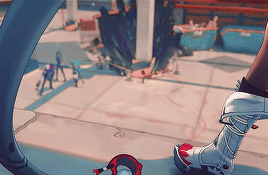







JANE DOE ❖ undercover r&b
The big bad daddy who cussed you out every day is gone and yet you still miss him. What are you, a bunch of daddy's boys?
#zzz#zenless zone zero#zzzero#jane#jane doe#zzzedit#m:gifs#m:*#zzz spoilers#zzzero spoilers#zenless zone zero spoilers#1.1 spoilers#incoming complaining/thoughts about the quest ->#i think i only enjoyed this quest bc i like jane lol#otherwise it just felt like an insanely long character trial#most of it was just her running around talking to herself lmao#i wish the 'reveal' that she was an undercover cop came more as a twist it was revealed soooo early#i get that youre playing her for like the entirety of it but still. do some more stuff from seth's perspective or smth idk#and honestly the whole undercover cop thing was. eh jaskldfl too much copganda esp with seth's whole 'i hate dishonesty!!!!!!!' shtick#would have preferred if she was more of a morally ambiguous independent party who happens to have aligning goals situation#its boring when you know she's on “our side” for 99% of it. absolutely 0 stakes#i do love jane's gameplay though so i didn't mind all the battle sequences jakdljaf
842 notes
·
View notes
Text
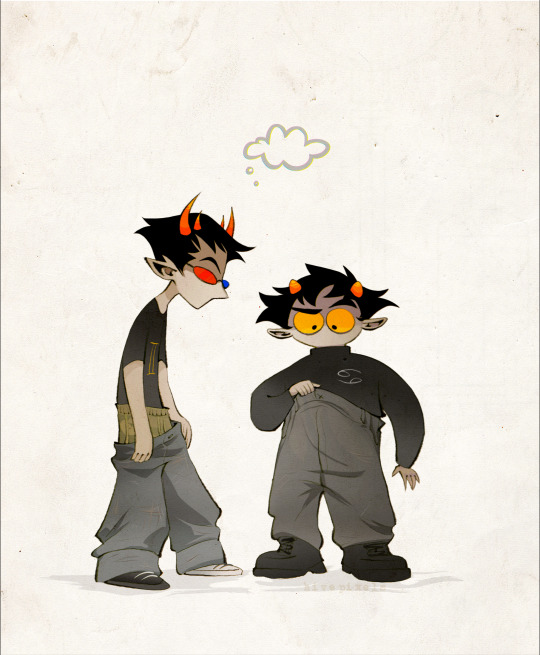
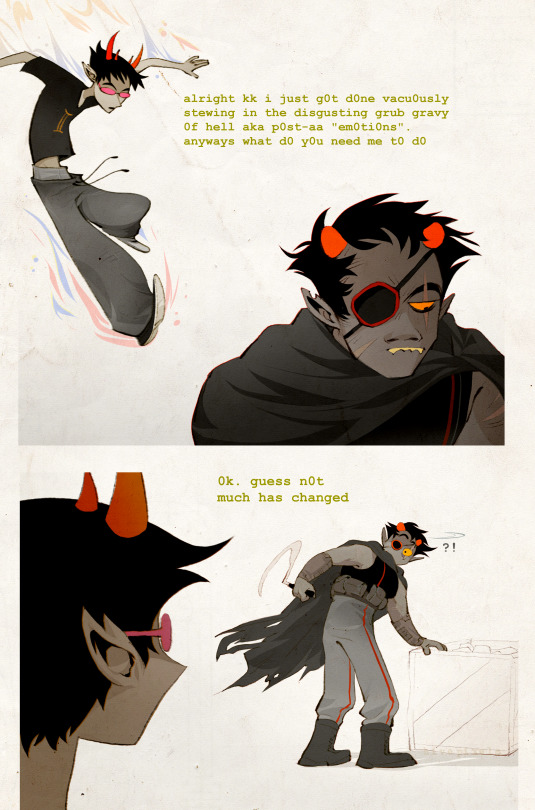
back in the day we had pantskat
now we have sagg sollux
#homestuck#hs2 tag#sollux captor#karkat vantas#solkat#sol's still blind but pls suspend disbelief for the sake of cursed pants meta#the contrasting parallels in fan reaction upon each reveal may have amused me more than it deserves#i wasnt there but. i think the general consensus is that pantskat = cute/funny and sagging sol = cool?? hot?? degen????🧍#lore extended: karkat briefs sollux boxers ?????#vioart#2023#listen there are very clearly deeply rooted psychological reasonings behind their preferred choice of trouser orientation alright......#we all see it even if we cant explain it.......
2K notes
·
View notes
Text
Okay, but y'all can't deny she fucking ate though



#dreamer talks#madoka magica rebellion#madoka magica#homura akemi#all the fits in this series look so damn fucking good#obligatory i would prefer if this outfit was just the tiniest bit less revealing#but otherwise she completely served and dominated with this look
468 notes
·
View notes
Text
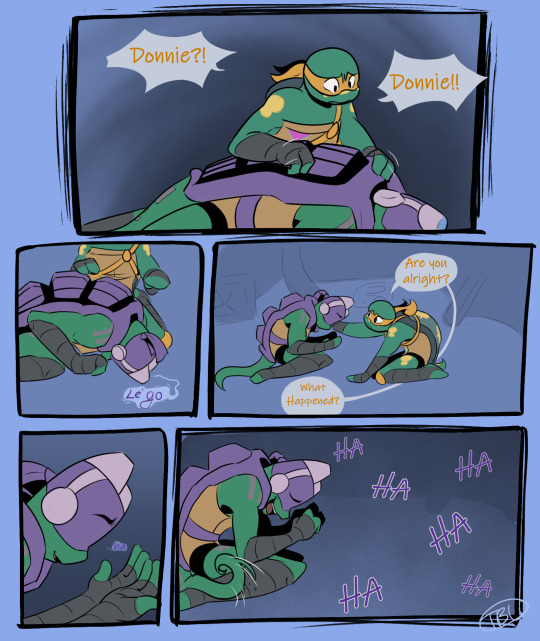
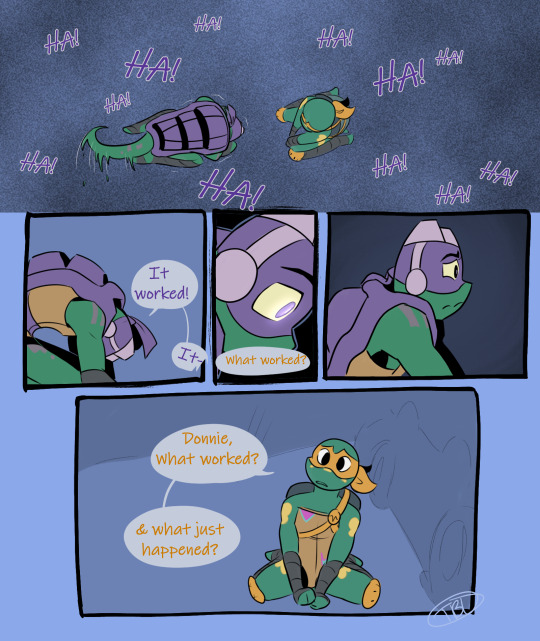
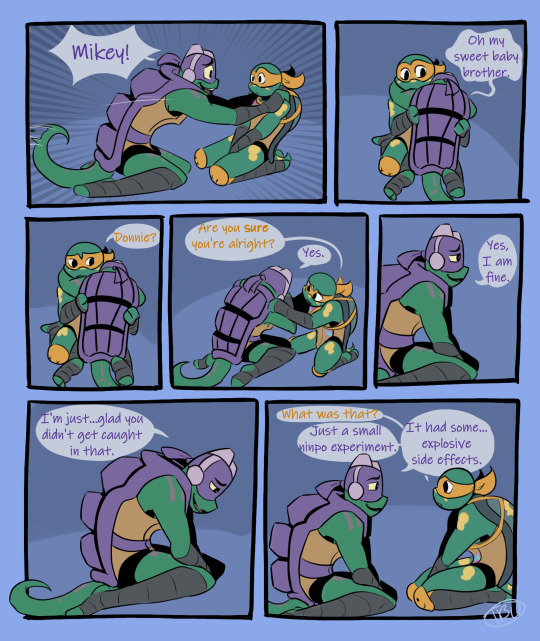
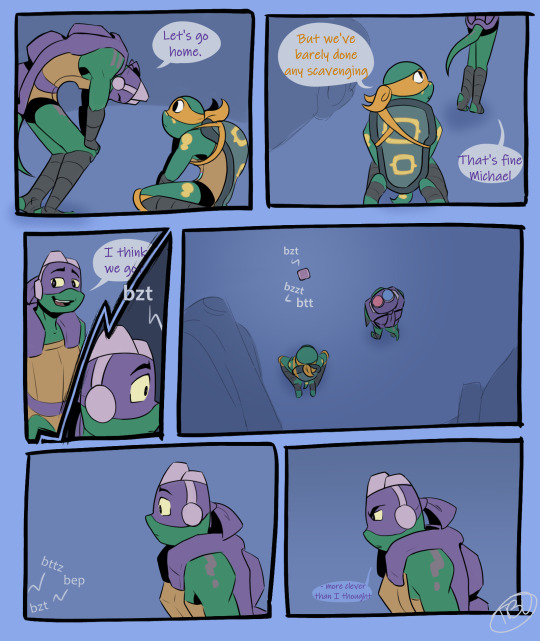
The Preferable Alternative-prologue-part 2
Start - Previous (just start) - Next
And here we go! : )
#tmnt#rottmnt#preferable alternative#my doodles#rise donnie#rise mikey#I feel like a lot of you are going to figure out exactly what's going on here before you're supposed to#but that's fine#I won't be confirming or denying it if you do#not until it's revealed in comic that is#after that oh boy do i have some very stupid jokes for you#and a lot of cool shit too#also i love drawing tails!#Especially Donnie's tail#it's so expressive!#he's just flipping and curling it around#and i love it#i should really slow down with this comic#i'm killing my hand so bad#but i'm having fun#so rip hand#the comic thanks you for your sacrifice lol
537 notes
·
View notes
Text
What are we putting on the wall now to replace the Francis Bacon ?
(…)
Ok let’s leave it bare for now… wait for revelation.

This is the wall in question. And the revelation, you guessed it.
They are insane.
#interview with the vampire#the vampire armand#louis de la pointe du lac#daniel molloy#lestat#and everything was actually not revealed#he would have took down the wall to expand the space if he knew the extent of the fuckery#also am I the only one who got 80s cool mom by Armand with his low collar and fluffy do#I mean it’s a concept but I prefer the new painting you bought#Armand hole in the wall#revelation iwtv
374 notes
·
View notes
Text
The one where Bruce is the asshole (again)
So! We have a typical story where the JLA finds out about the Situation in Amity.
Whichever way they find out doesn't matter, but either way they end up sending Batman to do a threat analysis and review of whether this requires their attention.
And while there, he runs into a Kid who obviously needs to be saved from his Abusive Home. Look at him, he's far too thin, his grades are horrible, he has many unexcused absences, and he has bruises hidden under his clothes.
Even after figuring out that Danny is Phantom the local Hero, he thinks Danny needs to be saved from his Parents.
I mean, it's plain to see! They Hates Ghosts with a Passion, negelct their son very often, shoot at him nearly every day, and are probably the ones who killed him in the first place!
So, with no input from Danny himself, Bruce calls CPS on the Fentons and uses his Wealth to expedite the process and avoid the actual Investigation. (I mean, why would you even need one? It's so obviously a bad home!)
The Fenton's are arrested, and Bruce reveals that Danny is Phantom to convince the Courts that they are horrible people for shooting at their own son, and that they should be locked up (ignoring the horrified looks on their faces, probably cause they were living with a Ghost for so long, thats probably why).
He immediately offers to adopt Danny, even when Danny vehemently refuses his offer. He knows that Danny will come around to it, he's doing this for his own good. He still thinks his Parents were good people, and not thr Villains they really were.
Meanwhile Danny's life has been completely uprooted thanks to the self-righteous machinations of an Adoption Crazed Fruitloop! And not even the usual one!
Sure his parents were often busy with their work, but they Always set aside time to hang out with their kids and make sure they were okay. They never abused him, the neglect was only for like a month or two when the portal before they got their act together and apologized for it, and (most importantly) THEY DIDN'T KNOW he was a Halfa when they shot at him! They only found out when the ASSHOLE revealed his Identity in Court!
And Danny is Extra enraged by that part. The Adoption Crazed Fruitloop had revealed his secret identity for the ENTIRE WORLD TO HEAR!
He would never be able to live a normal life anymore, even if he managed to get away from the Moron who caused all this!
Bruce Wayne was a Villain in his eyes.
He ripped him from his home and from his family (basically kidnapped), revealed his identity to the world so he was forced to stay with him for fear of the GIW, and spun the whole story so that it looked like he was the Good Guy in this!?
It was official. Danny Hates Bruce Wayne, possibly more than anyone else in the World.
And that's a High Bar.
#Dp x dc#Dpxdc#Dc x dp#Dcxdp#Danny Phantom#Dc#Dcu#Danny is enraged right now#It's not also not a “petty revenge” kind of rage#It's a “I will rip apart your entire life before doing the same to your very body” kind of rage#Bruce thinks he's the good guy in all this#He only exploited bis wealth to control the Courts#And forced a Family to be split up while taking the one that fit his preferences for himself#And revealed the identity of a Teenage Vigilante to the entire world basically condemning him if he ever leaves the Manor again#Also revealing him to the Government Organization that has dedicated its very existence to murdering him and his entire Race#He's the Good Guy no doubt about it#Jason disagrees#He can see exactly how much hatred Danny has in his eyes when he looks at Bruce#He sympathizes#Danny will probably try to murder Bruce in his sleep#The League thinks Batman found an abused child and took him in#They only know what Bruce told them but when the Question comes forward with the evidence from his OWN investigation?#Well...questions will be raised
1K notes
·
View notes
Text

commission for arlosexual on twitter of Shorty, i had such a fun time working on him! pinups are my favorite, but i’m especially fond of martini pinups!!
#kewpie's art#commission#graaaaghhhh it’s been revealed to me working on this that i really prefer drawing furries#shifting into doing mostly furry art now
511 notes
·
View notes
Text

[REVOKED] [RETAINED] [RED̴A̸C̵͍̔T̵̰̓E̸̘̽D̸̳̻͕́̒]̵̱̈́̋
#14 days with you#14dwy#Happy (late) White Day!!#I promised the 14DWY discord some [REDACTED] art but I went blind before I could start it </3 /lh /hj#It's missing a lot of key details because I didn't wanna spoil anything (like his burn marks; his official clothing; the tats; etc)#However the missing ring is intentional bc I like to think this happens 1 year after the Valentines Day art piece <3#I also didn't wanna reveal his /actual/ tattoos so I used a placeholder instead#Ngl it's kinda 👀👀........#I think I still prefer to OG though#🖤 — gallery.#💖 — about ren.#💖 — 14 days with queue.
2K notes
·
View notes
Text
The occasional urge to doodle what my original theory on Loop was that I firmly believed to be true until the very moment of the reveal, for sheer fondness of the completely false and oblivious world I lived in for my playthrough
#this... isn't... spoilers but#isat spoilers#i feel like i should anyway ...????????????#when i arrived at the reveal i naturally became very off balance with loop. but i took a moment to think about it (while vastly overwhelmed#and did decide that i preferred the truth
234 notes
·
View notes
Text

But when Harmonia shines...
#Whole reveal yay#I was gonna draw Atlas#well#beholding#but I prefer it just like this#sorry Soul#this feels so odd compared to my usual style ngl#cj whole#chonny jash#my art#charamuscadibuja
300 notes
·
View notes
Text

here's a quick reference list of a lot of the fonts i've used (and overused) on this blog, just in case anyone was curious to try one of these out with their own stuff!
#...i think this is revealing my strong preference for 50s-70s typography#some of these came preloaded with photopea and the others i all downloaded for free#shebbz shoutz#fonts#typography
177 notes
·
View notes
Text


@hereticcryptid I appear to be slowly but surely developing an entire series about how Hensheng and Baxia apparently get fed up with their owners' inability to express their feelings and take matters into their own hands...
#mdzs#jin guangyao#nie mingjue#jgy#nmj#nieyao#very sincerely this is a concept i keep coming back to and spinning around in my head#i find it unreasonably funny i want these swords revealing every tender feeling that these two are categorically incapable of admitting to#really i just want to bring the concept of e'ming and the general embarrassment hua cheng feels for his sabre at all times and throw it#into the mdzs world#can't quite bully the concept into an actual fic but i do love thinking about it and drawing art related to it#i assume nmj nearly went completely feral the first time hensheng shot out at him#like yup! he knew jgy was a snake! he's trying to attack him while his guard is down!!! well nmj is gonna deflect this fucking weak attack#and then SKEWER jgy and there's no way lxc can hold it against him!#except rather than deflecting hensheng baxia is a horrible traitor about it and instead he ends up getting cuddled by a touch-starved sword#0/10 nmj is having a horrible day he would genuinely have prefered jgy try to kill him (jgy would have ALSO prefered that as it happens)#(nhs on the other hand is having an AMAZING day when he sees it)#my art#THANK YOU EVERYONE THAT SENT ME PROMPTS!#this seriously helped get me through the day and made my evening so much better#i shall continue to go through them tomorrow after work as well 🥰🥰🥰#hensheng
130 notes
·
View notes
Note
How are you feeling about S17? I'm getting reaaal worried that it's going to be terrible. No Glenn in the writers room? A crossover episode?? Rob's gradual transformation into pondslime??? Help
Pondslime 😭Lmfao
I'm feeling more than fine about 17, really truly. I don't think anyone should be worried at all.
I think sometimes my interactions with Glenn come off a little more serious or abrasive than they really happened in real life (because we have to shout due to how loud it is in the bars), and my immediate transcription is just to get people *information*, which really doesn't convey tone.
For example, reporting that Glenn said "you don't want to know" in response to me asking for any teasers (as to plots this season) was met with a lot of "oh so this season is gonna suck" on Twitter, and that could not be further than the truth (sorry to the people I split-react blocked for saying that lol). In hindsight I get the reaction, because written out it's a response that can be easily misinterpreted and reads as potentially concerning, but know that when Glenn said "you don't want to know" he looked like this:

And when I was genuinely just asking for script information (regarding writers of individual scripts after he mentioned they had broken already) and mentioned Nina (Inflates) and Ross (DTAMHD), he gushed about both of them and then said, transcribed word for word, "It's been a good room, I'll say this it's been a great room. It's been an all-star room, it's been...like, breaking the stories this year has been really fun. [Me: Yeah?] Yeah. [That's great, that is great to hear.] It's been really fun."
So the idea of "no Glenn in the writers room" is really much more akin to Season 16 than 13/14. He was there to break stories (meaning he was in the room when they were brainstorming plot ideas and when they settled on which plots would be turned into scripts) but Rob and Charlie are taking the brunt of writing their (RCG's) scripts because of Sirens. This is the same thing that happened with The Gang Goes Bowling. Glenn's name is on the script, but Rob and Charlie wrote the majority of it while Glenn was shooting Blackberry. (I remember originally being convinced it was a mistake Glenn was listed as a writer for Bowling, lmfao). And Glenn is definitely still contributing, will be on revisions for the non-RCG scripts, and will classically change or improv whatever he thinks is best for Dennis when he's on set (see: the Risk E. Rats script).
Also, I know the crossover is concerning to a lot of people just given the nature of it, but as of what we know right now it's only on Abbott, so it's really just as if this season's The Gang Cracks the Liberty Bell or The Janitor Always Mops Twice took place on a different show instead of ours...
I promise promise promise Glenn was clearly holding his tongue for good things coming up, and Friday night very much restored my confidence that Season 17 will be good. (But..if you don't think Glenn has good contributions to Sunny or understands the agenda, then sorry this response probably sucks lmfao)
#i did the biggest fist pump the moment glenn's eyes were off us it was good#and i hate to say it but trust glenn knows who i am. he's talking to some gay kid way obsessed with the meta of his show#not a random dudebro whos hoping dennis is revealled as a serial killer this season#my conversations with glenn exist in the context of all that is and which came before...#additional thoughts i think a lot of people misinterpret what the major issue was with glenn not being in the writers room for 13 and 14#its not that he wasnt on scripts it's that he wasn't there from the beginning#blueskying and breaking the stories is so much more important to the season than anything in the scripts#they can always fix characterisation later. to the point of doing it on set#but if there's not enough good ideas and the stories suck for a characters motivation or the plots in general are just bleh#you can't even begin to write a good script#(and they really do need glenn for those things to come together. especially as a tie breaker or a veto)#whereas they like giving scripts to other writers (if not prefer it)!#like charlie said on directing: they get credit on everything for sunny so it's great to give someone else the opportunity#lucky 17#ask#glenn howerton
62 notes
·
View notes
Note
Weird question but do you have the 3D model of Ghost without his mask? I want to get his haircut.
There is no such thing as Ghost's hair in the game, all renders on the internet are artists' visions. Officially there is nothing except this one scene from cinematic, where you can see the back of his head (cinematic models are different from game models)

In that one big reddit leak of his face at the end of 2022 someone used Graves hair, but normally his model is bald OMG SHES BALD SHES BALD AND SHES TORTURING PEOPLE WHO HAVE HAIR
And I'm sorry but I don't plan to publish Ghost's full face because I don't want to get involved in leaks. For me Ghost is "ghost" and I want to stick with it. Unless COD changes their mind and officially shows his face, then maybe I'll start doing it👍
Sorry I didn't help but I hope you understand
#and I honestly prefer the mystery of not knowing his face#face reveals spoil the magic in my opinion#after all we all love him for his stupid skull mask#all i do is roll his balaclava to his nose to give him a kissss (i know i am cringe)
139 notes
·
View notes